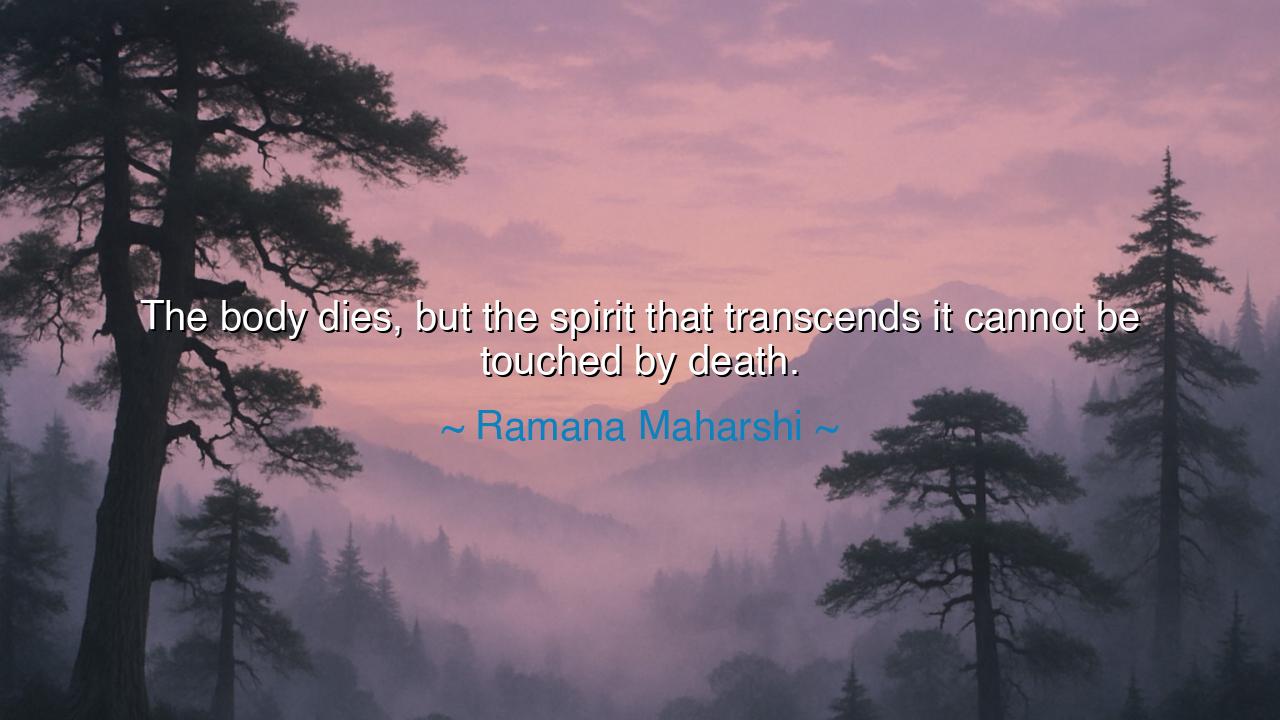
The body dies, but the spirit that transcends it cannot be






“The body dies, but the spirit that transcends it cannot be touched by death.” Thus spoke Ramana Maharshi, the silent sage of Arunachala, whose life was itself a living revelation of eternal truth. In these few words, he draws the curtain aside from the mystery of existence and shows us the radiant light that lies beyond the veil of mortality. For what we call death, he teaches, is but a change of form, a shedding of the vessel that once carried the infinite. The body, being born of time, must return to dust; but the spirit, which is beyond time, remains untouched, unbroken, everlasting.
The origin of this truth lies not merely in scripture, but in Ramana’s own experience. When he was but a boy of sixteen, he was seized by an overwhelming fear of death. Yet instead of fleeing, he turned inward to meet it face to face. He lay upon the ground, stilled his breath, and imagined the decay of his body—until a great realization dawned upon him: though the body perishes, the Self does not die. There is within each being an essence beyond name, beyond form, beyond birth and death. From that moment, Ramana lived as one who had already crossed the boundary of mortality. His words, therefore, are not philosophy but testimony—a truth seen, not merely believed.
When he says the body dies, he speaks of what is obvious to all who live: the frailty of flesh, the certainty of decay. Every wrinkle, every fading heartbeat reminds us that the physical form is but a garment worn for a time. Yet when he says the spirit cannot be touched by death, he unveils the hidden dimension of our being. The spirit—the pure awareness that witnesses life and thought and dream—has never been born and therefore can never die. It is the silent seer behind all experience, the eternal witness that remains when the world itself dissolves.
History too bears witness to this truth. When Socrates stood before his judges in Athens, condemned to drink the hemlock, he spoke calmly of death as a mere transition. “Be of good cheer about death,” he said to his friends, “for the soul departs to a place where truth may be seen more clearly.” Like Ramana Maharshi, he knew that the essence of being cannot perish. His serenity was not ignorance of death, but understanding of immortality. Across time and faith, from the Vedic sages to the philosophers of Greece, the enlightened have spoken with one voice: spirit transcends body, and life transcends death.
Yet, though this teaching shines with timeless truth, few live by it. We cling to the body and call it “I.” We mourn its decay, fear its loss, and in doing so, we bind ourselves to the illusion of mortality. Ramana’s words are an invitation to awaken—to know oneself as more than flesh and thought. To live from the awareness of the eternal Self is to live without fear, to meet both birth and death with the same quiet smile. The wise do not grieve when the body falls, for they know that life cannot be extinguished—it merely changes its cloak and continues on.
Consider this: the flame that burns within a lamp does not die when the lamp is broken; it simply rises into the open air. So too, when the body breaks, the spirit is freed. Those who have touched even a glimpse of this truth walk through the world with a strange lightness, for they no longer measure life by its length, but by its depth. They serve, they love, they act, knowing that the eternal cannot be harmed by time.
The lesson, then, is both simple and profound: do not identify yourself with what is perishable. Know yourself as the spirit, not the body; as awareness, not the thoughts that pass through it. Meditate daily upon this truth until it ceases to be belief and becomes experience. When sorrow comes, remember: it is the body that suffers, not the Self. When fear arises, remember: it is the mind that trembles, not the spirit. For within you dwells that which death cannot touch, that which was never born and will never end.
So, O seeker, heed the wisdom of Ramana Maharshi: the body dies, yes—but you do not. The spirit that animates you is older than the stars and vaster than the sky. Seek that Self, abide in it, and you shall know a peace that outlasts worlds. When the final moment comes, you will not cling nor weep, but walk through the gate of death as through an open door—returning home to the boundless, deathless truth from which you came.






AAdministratorAdministrator
Welcome, honored guests. Please leave a comment, we will respond soon